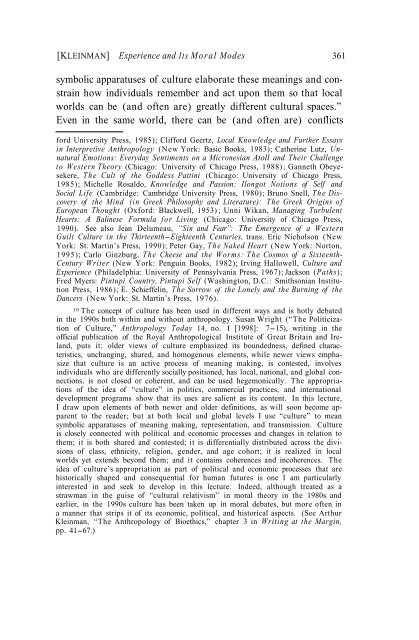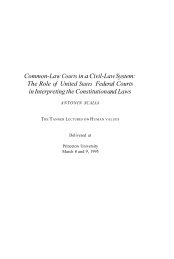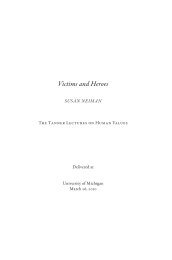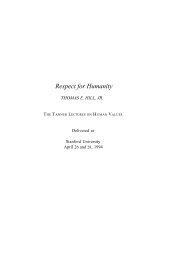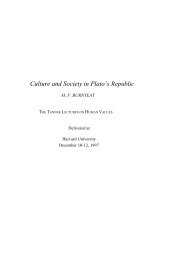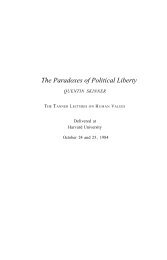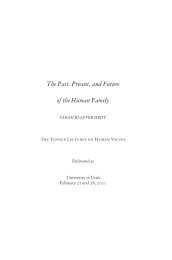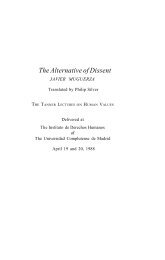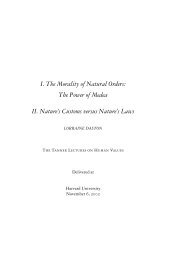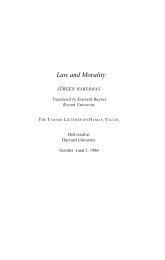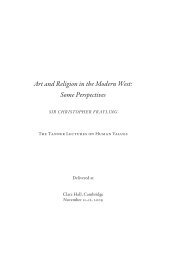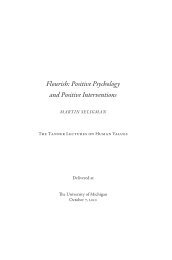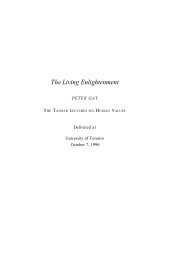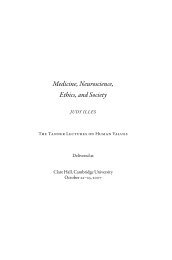Kleinman, Arthur - The Tanner Lectures on Human Values
Kleinman, Arthur - The Tanner Lectures on Human Values
Kleinman, Arthur - The Tanner Lectures on Human Values
You also want an ePaper? Increase the reach of your titles
YUMPU automatically turns print PDFs into web optimized ePapers that Google loves.
[KLEINMAN] Experience and Its Moral Modes 361symbolic apparatuses of culture elaborate these meanings and c<strong>on</strong>strainhow individuals remember and act up<strong>on</strong> them so that localworlds can be (and often are) greatly different cultural spaces.”Even in the same world, there can be (and often are) c<strong>on</strong>flictsford University Press, 1985); Clifford Geertz, Local Knowledge and Further Essaysin Interpretive Anthropology (New York: Basic Books, 1983); Catherine Lutz, UnnaturalEmoti<strong>on</strong>s: Everyday Sentiments <strong>on</strong> a Micr<strong>on</strong>esian Atoll and <str<strong>on</strong>g>The</str<strong>on</strong>g>ir Challengeto Western <str<strong>on</strong>g>The</str<strong>on</strong>g>ory (Chicago: University of Chicago Press, 1988) ; Ganneth Obeyesekere,<str<strong>on</strong>g>The</str<strong>on</strong>g> Cult of the Goddess Pattini (Chicago: University of Chicago Press,1985); Michelle Rosaldo, Knowledge and Passi<strong>on</strong>: Il<strong>on</strong>got Noti<strong>on</strong>s of Self andSocial Life (Cambridge: Cambridge University Press, 1980); Bruno Snell, <str<strong>on</strong>g>The</str<strong>on</strong>g> Discoveryof the Mind (in Greek Philosophy and Literature): <str<strong>on</strong>g>The</str<strong>on</strong>g> Greek Origins ofEuropean Thought (Oxford: Blackwell, 1953) ; Unni Wikan, Managing TurbulentHearts: A Balinese Formula for Living (Chicago: University of Chicago Press,1990). See also Jean Delumeau, “Sin and Fear”: <str<strong>on</strong>g>The</str<strong>on</strong>g> Emergence of a WesternGuilt Culture in the Thirteenth-Eighteenth Centuries, trans. Eric Nichols<strong>on</strong> (NewYork: St. Martin’s Press, 1990); Peter Gay, <str<strong>on</strong>g>The</str<strong>on</strong>g> Naked Heart (New York: Nort<strong>on</strong>,1995); Carlo Ginzburg, <str<strong>on</strong>g>The</str<strong>on</strong>g> Cheese and the Worms: <str<strong>on</strong>g>The</str<strong>on</strong>g> Cosmos of a Sixteenth-Century Writer (New York: Penguin Books, 1982); Irving Hallowell, Culture andExperience (Philadelphia: University of Pennsylvania Press, 1967) ; Jacks<strong>on</strong> (Paths) ;Fred Myers: Pintupi Country, Pintupi Self (Washingt<strong>on</strong>, D.C. : Smiths<strong>on</strong>ian Instituti<strong>on</strong>Press, 1986); E. Schieffelin, <str<strong>on</strong>g>The</str<strong>on</strong>g> Sorrow of the L<strong>on</strong>ely and the Burning of theDancers (New York: St. Martin’s Press, 1976).10 <str<strong>on</strong>g>The</str<strong>on</strong>g> c<strong>on</strong>cept of culture has been used in different ways and is hotly debatedin the 1990s both within and without anthropology. Susan Wright (“<str<strong>on</strong>g>The</str<strong>on</strong>g> Politicizati<strong>on</strong>of Culture,” Anthropology Today 14, no. 1 [1998]: 7-15), writing in theofficial publicati<strong>on</strong> of the Royal Anthropological Institute of Great Britain and Ireland,puts it: older views of culture emphasized its boundedness, defined characteristics,unchanging, shared, and homogenous elements, while newer views emphasizethat culture is an active process of meaning making, is c<strong>on</strong>tested, involvesindividuals who are differently socially positi<strong>on</strong>ed, has local, nati<strong>on</strong>al, and global c<strong>on</strong>necti<strong>on</strong>s,is not closed or coherent, and can be used hegem<strong>on</strong>ically. <str<strong>on</strong>g>The</str<strong>on</strong>g> appropriati<strong>on</strong>sof the idea of “culture” in politics, commercial practices, and internati<strong>on</strong>aldevelopment programs show that its uses are salient as its c<strong>on</strong>tent. In this lecture,I draw up<strong>on</strong> elements of both newer and older definiti<strong>on</strong>s, as will so<strong>on</strong> become apparentto the reader; but at both local and global levels I use “culture” to meansymbolic apparatuses of meaning making, representati<strong>on</strong>, and transmissi<strong>on</strong>. Cultureis closely c<strong>on</strong>nected with political and ec<strong>on</strong>omic processes and changes in relati<strong>on</strong> tothem; it is both shared and c<strong>on</strong>tested; it is differentially distributed across the divisi<strong>on</strong>sof class, ethnicity, religi<strong>on</strong>, gender, and age cohort; it is realized in localworlds yet extends bey<strong>on</strong>d them; and it c<strong>on</strong>tains coherences and incoherences. <str<strong>on</strong>g>The</str<strong>on</strong>g>idea of culture’s appropriati<strong>on</strong> as part of political and ec<strong>on</strong>omic processes that arehistorically shaped and c<strong>on</strong>sequential for human futures is <strong>on</strong>e I am particularlyinterested in and seek to develop in this lecture. Indeed, although treated as astrawman in the guise of “cultural relativism” in moral theory in the 1980s andearlier, in the 1990s culture has been taken up in moral debates, but more often ina manner that strips it of its ec<strong>on</strong>omic, political, and historical aspects. (See <str<strong>on</strong>g>Arthur</str<strong>on</strong>g><str<strong>on</strong>g>Kleinman</str<strong>on</strong>g>, “<str<strong>on</strong>g>The</str<strong>on</strong>g> Anthropology of Bioethics,” chapter 3 in Writing at the Margin,pp. 41-67.)


